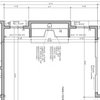Anyone see any "risk" in this?
njbuilding143
10 years ago
Related Stories

DECORATING GUIDESYour Decor: The Joy of the Calculated Risk
Celebrate the Color and Surprise of Highly Personalized Homes
Full Story
DECORATING GUIDESStep Away From the Wallpaper: Why Decorating Risks Are Overrated
Want to find your signature style? Try staying inside your comfort zone
Full Story
GARDENING GUIDES13 Risks to Take for True Garden Rewards
Go ahead, be a rebel. Breaking rules in the garden can lead to more happiness, creativity and connection with the earth
Full Story
MOVING5 Risks in Buying a Short-Sale Home — and How to Handle Them
Don’t let the lure of a great deal blind you to the hidden costs and issues in snagging a short-sale property
Full Story
FUN HOUZZSmell This Shocking Flower at Your Own Risk
Don't say we didn't warn you: The foul scent of the rare and incredible corpse flower may knock your socks off
Full Story
COMMUNITYCommunity Building Just About Anyone Can Do
Strengthen neighborhoods and pride of place by setting up more public spaces — even small, temporary ones can make a big difference
Full Story
DECORATING GUIDESDesign Risks From Mild to Wild
These interiors aren’t afraid to stand out — in fact, they embrace their distinctive features
Full Story
DESIGN FOR GOODAt-Risk Teens Get a Well-Designed Home and Real Hope
Designers and other volunteers create an apartment to keep older foster kids off the streets, off drugs and on a path to a better life
Full Story
BOLD COLORThe Joy of Taking Risks in Design
Not interested in playing it safe? Then check out these 14 bold spaces
Full Story
BUDGET DECORATINGThe Cure for Houzz Envy: Living Room Touches Anyone Can Do
Spiff up your living room with very little effort or expense, using ideas borrowed from covetable ones
Full Story








renovator8
Awnmyown
Related Professionals
Holiday Home Builders · Lewisville Home Builders · Wilmington Home Builders · Eagan General Contractors · Arlington General Contractors · Citrus Heights General Contractors · Endicott General Contractors · Foothill Ranch General Contractors · Groveton General Contractors · Lewisburg General Contractors · Mineral Wells General Contractors · Mira Loma General Contractors · Red Wing General Contractors · Syosset General Contractors · University Park General Contractors